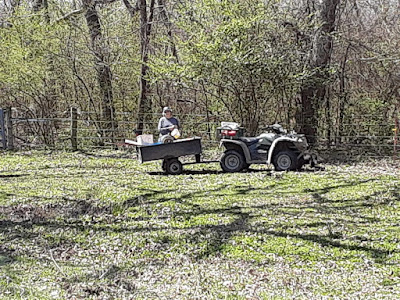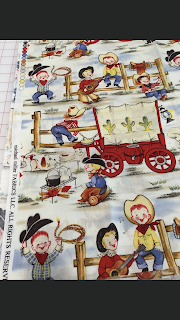I came up with these directions, and I hope we can help fill the void to help protect our medical workers... share away! These masks are better than they have - which is nothing - but they are NOT hospital quality.
Materials:
Fabric at least 8" x 14"
Thread
Fabric pen or chalk
Interfacing (very thin breathable)
Pipe Cleaner
1/4" elastic (2 pieces cut to 7.5" each)
Ruler
Cut 1 piece of fabric 8” x 14”
Fold 8” sides together with right sides together. Sew the top 8" with 1/4” seam leaving sides open;
Turn right side out. Iron with seam on one edge.
With a fabric pen, mark 1-1/2” line across from bottom edge (this will be the top of the mask). Be sure you are using a fabric pen or chalk as this will show.
Continue marking lines every half inch up from there until you have reached the 5” mark.
Put two layers of 8” x 6.5” (iron on) interfacing (very thin, breathable) inside at this point. Be sure it has very fine weaving. I would not use 4 layers of FABRIC as one layer of interfacing makes it pretty thick; two thicker and 4 of fabric definitely will. Iron.
Edited here to add, I found that if I ironed the interfacing on the wrong sides of the fabric before flipping it, it was much easier!
I just had a suggestion of adding pipe cleaners to the bridge of the top of the mask.
So I did it! I cut the pipe cleaner in half (6") just an inch and a half shorter than the mask. After I flipped the right sides of the mask out, I sewed a 3/8 inch seam across the bridge of the nose (opposite side from the seam) and I slid the pipe cleaner inside. It helps to know the pipe cleaners are directional - meaning it is easier to put in one way than fight the grain the other way. I did all of this BEFORE making the 'pockets' in the directions below.
Start by pinching the 1-1/2” line and folding under 1/2” (away from your drawn lines) to make a pocket. Pin. This 1-1/2” pocket (on the bottom) will actually be the top of the mask.
Continue up the 1/2” marks making 2 more ‘pockets’ with 1/2” tucked under. I had to flip the mask to be able to pin easier.
After making and securing all 3 'pockets', Sew the edges together with 1/4” seam to secure pockets, removing pins as you get to them.
My first masks had this bias tape, you can either use it or skip it. Directions to skip it are below the ones to use it... lol...
I used double fold bias tape for the edges. I cut it a bit (1/2”?) larger than the sides of the masks.
Open the first fold and tuck the ends in and then iron, then refold (to original fold with ends tucked in) and iron again. clip the edges a bit so they won’t show when sewn.
Let me just add here, you can skip the bias tape part and add the elastic behind when you sew the pockets down. It is your preference.
If you decide NOT to use the bias tape, I just sewed the pockets with a straight stitch, then came back to each side, zig zagged close together and added the elastic. I trimmed the edges after zig zagging. It looks fine and I think it will work better - it will definitely be quicker.
Cut two 6.5” pieces of 1/4” elastic:
Stick the edge of the mask into the center fold of the bias tape, wrapping the bias tape around to both sides with edge at top of mask. Be sure mask is tucked all the way to fold of bias tape. Start sewing. 1/2” from beginning, place one edge of elastic in, pushing all the way to fold and sew over it.
Continue to the other end stopping 3/4” from end and tucking elastic end into fold as previously done, (be sure it isn’t twisted) and sew over it. Repeat on other end of mask.
Make a final ironing of your mask, trim threads and it is finished! I place each in a plastic bag to distribute safely.
I made 5 this afternoon and will make many more tomorrow. Hope this helps others.
Gosh, this is difficult to do on a cell phone!
Finished without the bias tape, elastic is in behind the mask,
which makes it sit funny for the picture...


















































